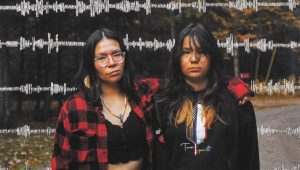
Indigenous Two-Spirit and LGBTQ+ artists often add another layer of expression to their work and stories. On top of celebrating their tribal and personal identities, they’re bringing stories and voices forward that aren’t often heard from elsewhere. They can also provide recognition and support for other LGBTQ2+ people searching for connection. We’ll take a look at three new and upcoming Indigenous Two-Spirit and LGBTQ+ art exhibits: “Queering Indigeneity” coming to the Minnesota Museum of American Art, “Two-Spirit and MMIW/R Voices” touring Minnesota, and “Two-Spirit and Gender Diversity through History” at the new Orillia Recreation Centre in Ontario, Canada.
GUESTS
Penny Kagigebi (White Earth Ojibwe), artist and emerging curator
Dr. Kate Beane (Flandreau Santee Dakota and Muscogee), executive director of the Minnesota Museum of American Art
Arnold Dahl-Wooley (Leech Lake Band of Ojibwe), national public speaker, advocate for the Two-Spirit LGBTQ+ community, and Twin Cities Pride BIPOC Leader of the Year
Jessica Martin (Métis), goldsmith, fiddle player, and yoga instructor
Monica Loney, (Métis) visual artist
Break 1 Music: Out Loud (song) Ailani (artist) Heartbroken Bones (album)
Break 2 Music: Bounty (song) Deerlady (band) Greatest Hits (album)

